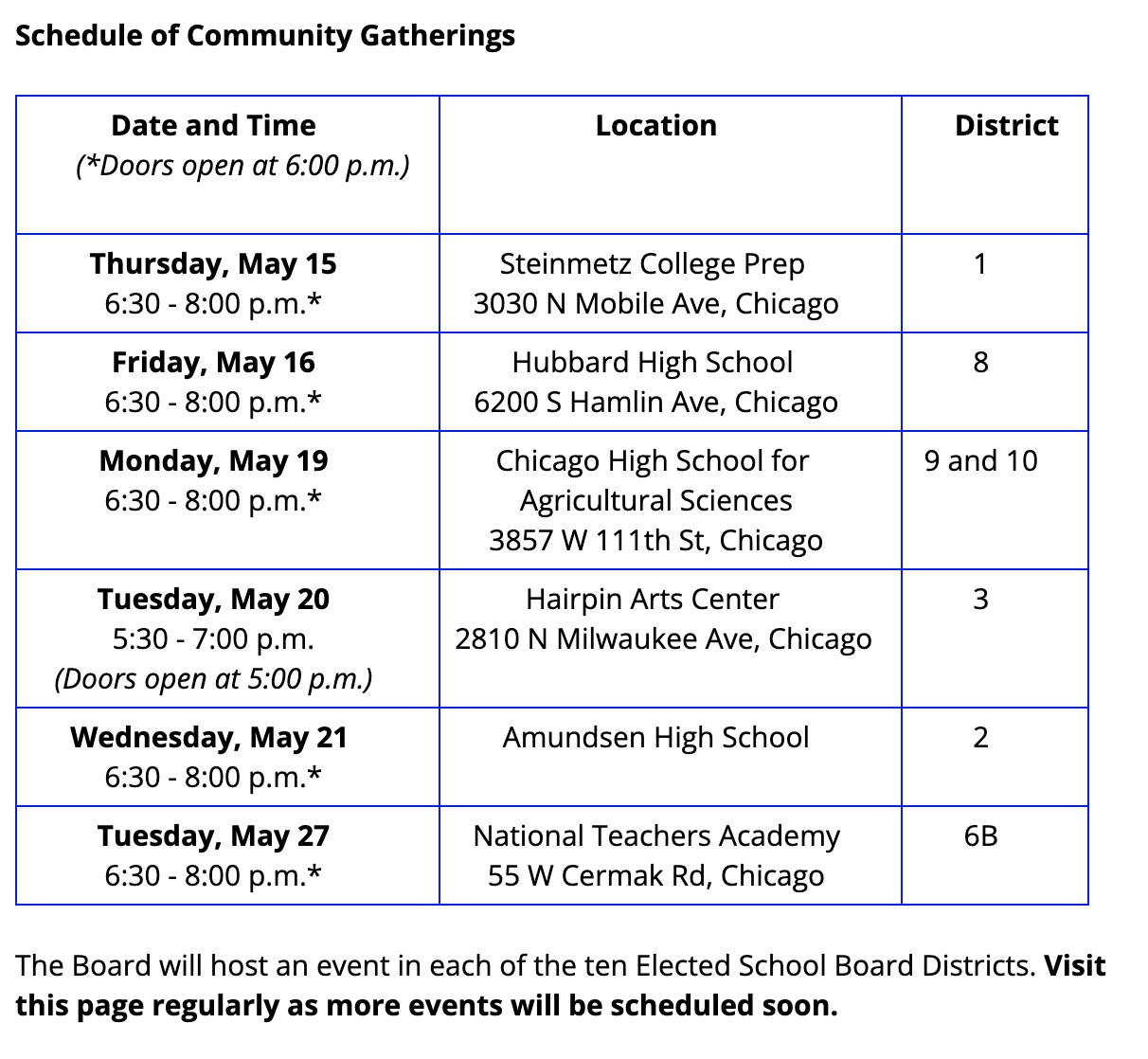Super Search Forums, School Improvement, Arts Ed

Last week, Board Rule looked at what's happening with the superintendent/CEO search. Since then, a first round of community forums has been announced. Here's the schedule so far:

To keep up on all things related to the superintendent search, bookmark the Chicago Board of Education's super search webpage.
Last week, board member Ellen Rosenfeld partnered with the Jewish United Fund to host a virtual forum, asking parents what they would look for in a superintendent. Many parents attending had young children just starting in the Chicago Public Schools, although at least a couple had high schoolers.
Many parents at this forum wanted a new district leader with the political savvy to keep the Chicago Teachers Union from striking and the cultural sensitivity to navigate the fraught line between robust political disagreement about the Israeli-Palestinian conflict and antisemitism. Parents of early readers also asked tough questions about the quality of teaching happening in early literacy and whether CPS has a deep commitment to evidence-based reading instruction. One even mentioned journalist Emily Hanford's work debunking popular but ineffective ways to teach reading.
What struck me the most in the conversation were the topics not mentioned that have come up prominently in other community forums: school security, mental health, after-school programming, and arts education. Perhaps these topics didn't arise because these parents aren't experiencing issues in these areas at their schools. Stay tuned for more perspectives once more community forums are held.
Board Mini-Retreat Tackles School Improvement
This morning, the Board is holding a special meeting starting at 9 a.m. to complete some of its required training with the Illinois Association of School Boards. The two big topics on the agenda are school improvement and how to monitor district goals.
For many years, school improvement in Chicago has paid attention to the 5Es, or five essentials for school improvement: effective leaders, collaborative teachers, involved families, supportive environment, and ambitious instruction. Multiple studies from the UChicago Consortium on School Research have shown that schools strong in at least three of these five essentials were 10 times more likely to show substantial student academic growth than schools weak in at least three of these areas.
CPS is now revamping its school accountability system to refocus on school improvement, use a wider array of metrics beyond test scores, and offer parents and the public a richer view of what's happening inside each school. The work was highlighted in an April report from FutureEd, an independent think tank based at Georgetown University's McCourt School of Public Policy. (Disclosure: I served as FutureEd's editorial director from September 2023 to August 2024.)
In the report, CPS director of school quality measurement and research Jeffrey Bloom says the new measurement system will answer three questions of interest to stakeholders: What should schools be doing to support students academically, socially, and emotionally? Is my school doing these things? How is the district supporting my school to get better at doing these things?
Perhaps the most welcome shift in the new school improvement/accountability system is its explicit effort to show how the school district is supporting schools in their efforts to improve. School improvement requires resources, and school districts need to work with schools to target resources where they are needed for improvement. The FutureEd report recommends that states and districts "lean into the school improvement process" and "hold districts accountable for providing schools with the people, time, and money they need to succeed."
In December, CPS unveiled its new school profiles, which include many new measures related to students' academic progress, school climate, and community engagement. Some measures are still in development. CPS expects the dashboards to be complete by fall 2025. While there's still a lot to do to make the new profiles user-friendly, as Chalkbeat noted in January, parents have welcomed the shift to offer a more holistic view of schools and focus accountability efforts on improving schools, not just labeling them as failures.
New Plan for Arts Education
Also today, CEO Pedro Martinez and other district leaders involved in arts programming in schools will speak at the City Club about the district's new arts plan.
The Arts Education Plan 2.0 is the latest in more than a decade of work to shore up arts offerings after decades of disinvestment. In 2011, arts organizations, educators, and local funders came together to found Ingenuity Chicago, a nonprofit advocate and supporter of arts education. For 12 years, Ingenuity has tracked CPS students' access to arts education. Since 2013, the group has contributed more than $21 million to arts programs in CPS.
In short, while there has been remarkable progress in increasing arts access in CPS, there's still plenty of room to grow, especially in equity and quality. The Arts Education Plan 2.0 aims to address that. Of course the question looming in the background is: will the district be able to sustain these gains, let alone build on them, in a time of decreased resources?
Comments ()